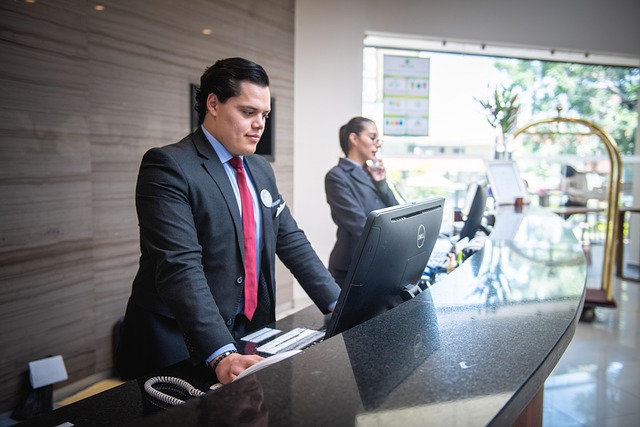Remote medical receptionist services streamline healthcare operations by handling calls, scheduling appointments, and answering patient queries in real-time, enhancing satisfaction and efficiency while freeing up time for direct patient care. This cost-effective solution optimizes call handling, improves clinical outcomes, and enables healthcare providers to focus on quality care.
In today’s digital age, healthcare practices seek efficient solutions to enhance operational fluency. Remote medical receptionist services offer a game-changer in this landscape. By outsourcing reception tasks, healthcare providers can streamline operations, ensuring prompt call handling and efficient patient scheduling in real time. These virtual assistants manage incoming calls, resolve queries, and optimize appointment management, thereby enhancing the overall patient experience without breaking the bank. This article explores the multifaceted benefits of remote receptionist services tailored to healthcare’s dynamic needs.
- Streamlining Healthcare Operations: Remote Receptionist Services
- Efficient Call Handling: Real-Time Solutions for Practices
- Patient Scheduling: Optimizing Appointment Management
- Query Resolution: Instant Support Through Remote Receptionists
- Cost-Effective Care: Benefits of Outsourcing Reception Services
- Enhancing Patient Experience: Responsive Healthcare Support
Streamlining Healthcare Operations: Remote Receptionist Services

In today’s digital age, healthcare practices are constantly seeking ways to streamline operations and enhance patient experiences. One effective strategy gaining traction is the implementation of remote receptionist services. These services provide a robust solution for handling incoming calls, scheduling appointments, and addressing patient queries in real-time, all without the need for dedicated on-site front desk staff. By outsourcing these tasks to skilled remote medical receptionists, healthcare providers can significantly reduce operational costs and free up valuable time for focus on direct patient care.
An online receptionist or clinic support staff member working remotely can efficiently manage a wide range of administrative duties, ensuring smooth day-to-day operations. They can greet patients warmly over the phone, gather necessary information, and navigate the scheduling process with ease. This level of professionalism and responsiveness not only improves patient satisfaction but also contributes to better clinical outcomes. With an outsourced front desk in place, healthcare practices can maintain a consistent flow of communication, ensuring every patient receives personalized attention from the moment they reach out until their visit concludes.
Efficient Call Handling: Real-Time Solutions for Practices

In today’s digital era, efficient call handling is non-negotiable for healthcare practices aiming to deliver exceptional patient care. Traditional on-site receptionists are often limited by their physical presence and can struggle to keep up with the constant influx of calls, especially during peak hours. This is where remote medical receptionist services prove invaluable. With a digital receptionist healthcare solution, medical practices gain access to a dedicated team capable of managing incoming calls promptly and professionally. These remote answering healthcare specialists are trained to handle patient queries, schedule appointments, and provide crucial clinic support staff services in real-time, ensuring no call goes unanswered.
By outsourcing call handling to a remote answering service, healthcare providers can experience improved patient satisfaction and streamlined operational efficiency. This approach allows medical professionals to focus on delivering quality care while their administrative tasks are managed by skilled, remote receptionists who are equipped with the latest tools and technologies. Thus, it’s not just about having an answering service; it’s about having a reliable partner that understands the unique needs of healthcare practices and provides tailored solutions for efficient call handling and patient engagement.
Patient Scheduling: Optimizing Appointment Management

Patient Scheduling: Optimizing Appointment Management with Remote Medical Receptionist Services
In today’s fast-paced healthcare landscape, efficient patient scheduling is paramount for ensuring timely care and maximizing clinic resources. Remote medical receptionist services offer a game-changing solution by providing dedicated front-desk support without the overhead of hiring in-house staff. These digital receptionists are trained to handle appointment booking, rescheduling, and cancellations promptly, leveraging specialized software to streamline the process. By outsourcing front desk operations, healthcare practices can free up valuable time for medical professionals, enabling them to focus on patient care rather than administrative tasks.
Furthermore, remote medical receptionists can manage patient queries in real-time, providing immediate responses to calls, emails, and text messages. This proactive approach enhances patient satisfaction by reducing wait times and ensuring every interaction is handled with professionalism and warmth. With a digital receptionist healthcare solution in place, clinic support staff can be more productive, leading to improved operational efficiency and better patient outcomes.
Query Resolution: Instant Support Through Remote Receptionists

Remote medical receptionists provide instant query resolution for healthcare practices, ensuring patients receive prompt and accurate support. Unlike traditional in-house front desk staff, remote receptions are accessible 24/7, handling incoming calls, scheduling appointments, and answering patient questions from any location. This means faster response times to patient inquiries, reduced wait times, and improved overall satisfaction.
With an online receptionist, healthcare providers can focus on patient care while delegating administrative tasks to qualified professionals. Outsourced front desk services offer a cost-effective solution, eliminating the need for hiring, training, and managing in-house clinic support staff. This allows practices to maintain efficient operations without incurring overhead costs associated with full-time employees.
Cost-Effective Care: Benefits of Outsourcing Reception Services

Outsourcing reception services to a remote medical receptionist can significantly reduce operational costs for healthcare practices. By hiring virtual staff, clinics and hospitals can save on overhead expenses such as office space, equipment, and benefits packages. Remote answering healthcare services provide expert front desk support without the need for in-house employees, allowing practices to allocate resources more efficiently.
This cost-effective care model also offers increased flexibility. Practices can scale their reception staff up or down based on demand, ensuring optimal staffing levels during peak and off-peak hours. An outsourced front desk can handle a high volume of incoming calls, schedule appointments effectively, and manage patient queries promptly, ultimately improving the overall patient experience and enhancing the practice’s reputation.
Enhancing Patient Experience: Responsive Healthcare Support

In today’s fast-paced healthcare landscape, delivering an exceptional patient experience is paramount to building trust and fostering loyalty. Remote medical receptionist services play a pivotal role in achieving this by offering responsive and reliable support that mirrors the warmth and efficiency of an on-site front desk. With skilled professionals managing incoming calls, scheduling appointments, and promptly addressing patient queries, these services ensure that every interaction is handled with care and precision.
An outsourced front desk, functioning as a digital receptionist healthcare solution, can significantly enhance patient satisfaction. By providing real-time assistance, they reduce wait times, offer 24/7 availability, and ensure patients receive accurate information promptly. This not only improves the overall experience but also facilitates better communication, allowing healthcare practices to focus on delivering quality care while maintaining efficient operations.
